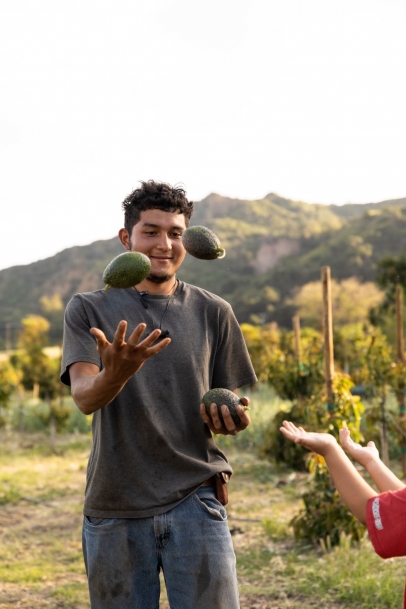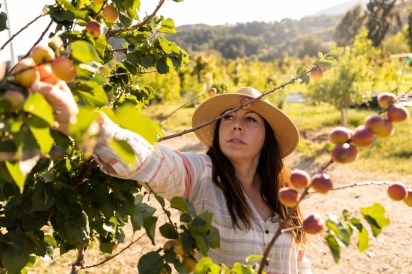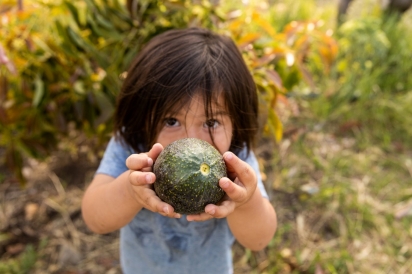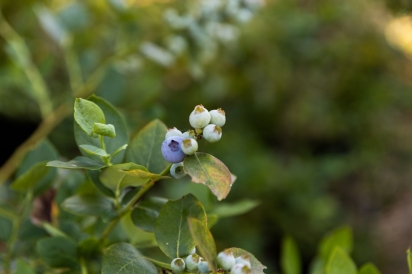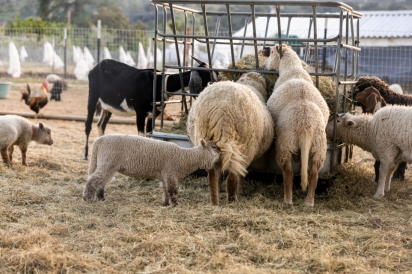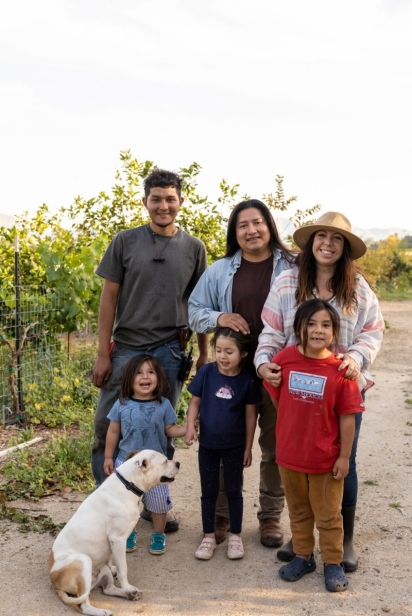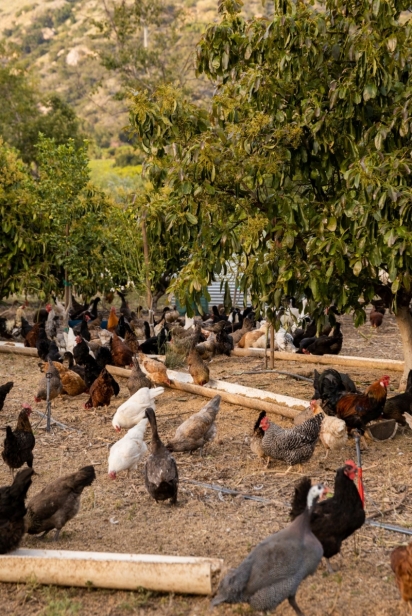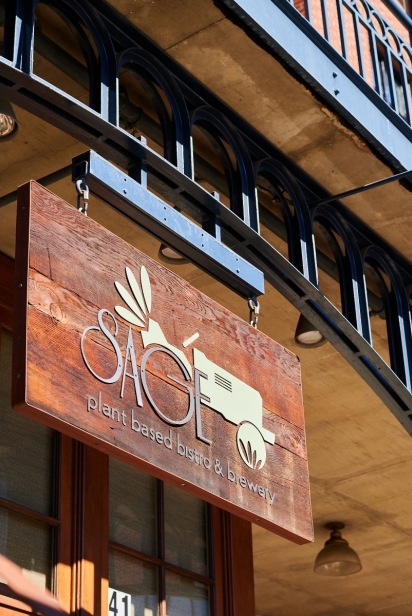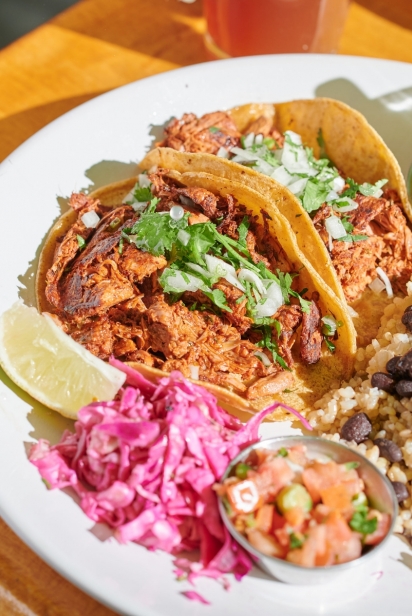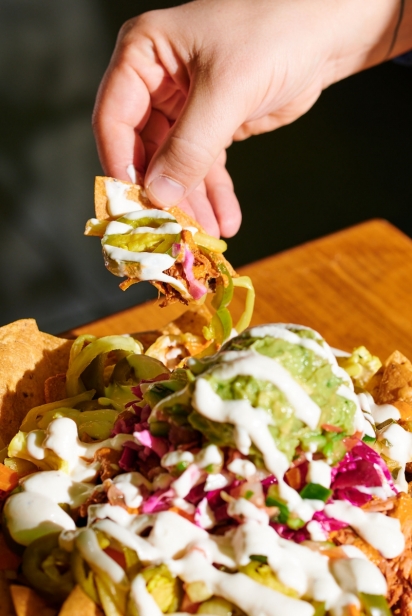Full-Circle Farming
Golf Course to Farm
Mollie Engelhart is on a mission to feed more families healthy food from healthy soil.
It all started with a vegan ice cream shop, Kind Kreme, co-founded by Engelhart in 2010 in Los Angeles. The ice cream shops were integrated into the Sage Plant Based Bistros that Engelhart now co-owns with her husband, Elias Sosa, the first of which was opened in Echo Park in 2011. A second location in Culver City was backed by actor Woody Harrelson, then came a third outlet in Pasadena and, most recently, in 2020, a fourth in Agoura Hills.
But the real game changer for Engelhart was a 2013 TED Talk by soil educator Graeme Sait.
“I realized there was something we could do. Prior to that I drove my hybrid, I brought my bags to the grocery store, I drank my oat milk latte and I felt apathetic. When I realized there was a path forward, and it was about partnering with the soil, partnering with nature, partnering with plants, I was moved to make a complete shift in my life.”
And she eventually did, moving from a golf-club estate in Granada Hills to a farm in Fillmore in 2018 to “build healthy soil.” That 20-acre farm, called Sow a Heart, is where Engelhart and Sosa started experimenting with regenerative agriculture, an integrated approach to farming that was used by Indigenous communities and aims to sequester both carbon and water in the soil. According to the Sow a Heart website, regenerative agriculture includes both “farming and grazing practices that... reverse climate change by rebuilding soil organic matter and restoring degraded soil biodiversity.”
Engelhart and her husband have since bought two more properties in Fillmore, bringing their total acreage on which to practice regenerative farming to somewhere between 60 and 70.
Given that Sage Bistro is a plant-based restaurant group, it may be surprising to learn that animals play a key role on the Fillmore farms. Engelhart explains, they are “compost makers, lawn mowers, manure makers and fertilizer makers.”
Short sheep—a cross between Dorpers and Babydolls—are bred on the farm for orchard grazing for people who don’t want to use Roundup. Dairy cows and goats supply manure and, for the non-vegans living on the farm, milk. They do not slaughter their animals, but Engelhart also volunteers that her husband, Sosa, eats meat and she’s “not someone who believes that there’s only one diet for everybody.”
“Before I was farming and I was just a vegan chef, I had very didactic views about what veganism should be,” she says. “That’s an inquiry that I’m still in. Farming changes the way you look at life and death, because even though we don’t harvest animals, animals die. Nature is cruel.”
Engelhart is forthright in discussing potentially controversial topics beyond the crossroads of veganism and animals in agriculture. Early on in our conversation she acknowledges that Sow a Heart is not her first foray into agriculture. She previously spent many years growing marijuana. “I’m good at farming so I was good at that too.”
Farm to Table... to Farm
The relationship between Sow a Heart farm and the Sage Bistro and Brewery enterprise is symbiotic. Engelhart estimates the farm supplies 10–15% of the produce for the restaurants, and scraps from the restaurant and adjacent enterprises are returned to the farm for compost, preventing them from producing harmful methane in landfill. According to the EPA, “methane is more than 25 times as potent as carbon dioxide at trapping heat in the atmosphere.” This closed-loop process is one example of how regenerative practices help fight climate change.
(Many California residents became more aware of the problem of food waste in landfills when a law took effect in January 2022 requiring household food waste recycling. As a result, many of us now separate kitchen scraps into a bag that goes into our garden waste each week.)
Regenerative farming is also more water efficient, a key consideration in drought-ridden California. Engelhart says that on one of their Fillmore parcels they used half as much water as a neighbor with a similar-sized property but yielded 20 times as much value in produce. She acknowledges it took more labor but uses the example to push back on the idea of needing GMOs to feed the world. “I’m saying, ‘No, we just need more people to care about the Earth and more custodians of the Earth, and we can use land so much more efficiently.’”
While Engelhart has no plans to open any Sage Bistros in Ventura County, residents can try her food by buying community-supported agriculture (CSA) farm boxes on the Sow a Heart website. About two-thirds of the CSA box comes from their farms, with the rest coming from other Ventura County farms that engage in regenerative agriculture, including Ayala Farms. They are also at the Ojai Community Farmers’ Market every Thursday.
For a more immersive experience, join a volunteer Sunday at Sow a Heart for land work and a vegan/vegetarian lunch. If you prefer to drink your produce, hops from Sow a Heart are used by Ventura’s Poseidon Brewing Company.
And if you happen to be in Texas, there will soon be another chance to interact with Engelhart’s food. She and Sosa recently bought 200 acres in Bandera, Texas—about an hour northwest of San Antonio—where they will undertake holistic planned grazing on a larger scale.
“I want to see what’s possible,” Engelhart explains. They also plan to open a Sage Bistro and a Oaxacan restaurant (Sosa is from the Mexican state of Oaxaca) with a shared kitchen and the same farm-to-table concept in San Antonio around the end of the year.
The Proof Is on the Plate
Shortly after I interviewed Engelhart, I went to the Sage Bistro in Agoura Hills for dinner. As a mostly vegan eater who loves dining out, I’m used to asking servers in my nicest voice to substitute olive oil for butter or leave the cheese out of a dish. Usually there are a few items on the menu that will work, which is to say I eat a lot of pizza marinara and plant-based burgers.
I am largely resigned to my lot in life being meager menu selections, but Sage, whose plant-based offering rivals the legendary proportions of The Cheesecake Factory’s spiral-bound beast, is a welcome respite. And we’re not just talking run-of-the-mill vegan fare. Yes, there are the requisite salads and smoothies and bowls, but there are also share plates, pizzas, entrées, tacos and sides—enough to cover both sides of the placemat-size menu.
Then there are the supplemental menus, one for booze, including kombuchas, beers and seltzers from Sage Brews, and another for nonalcoholic drinks and desserts. On the latter are juices, smoothies, wellness shots and shakes; coffees, including eight different lattes (sweet potato, anyone?); and 12 flavors of ice cream to eat solo or with one of the 10 house-made desserts, like the bread pudding my husband and I clashed spoons over as we staked our claims to the final bite. If you take a non-vegan to Sage and they complain there’s nothing they want to eat, they’re just not trying.
In the Agoura Hills restaurant, Engelhart’s ambition manifests beyond the menu. A TV mounted on a wall runs a loop of videos from her YouTube channel. Near the host stand, a corner of the restaurant is dedicated to Sage swag, including apparel and farm-based pantry items, from popcorn kernels to orange-based cleaning products. As she spreads her empire east to Texas this year, I can’t help thinking: This is Engelhart’s world, we all just get to eat in it.


